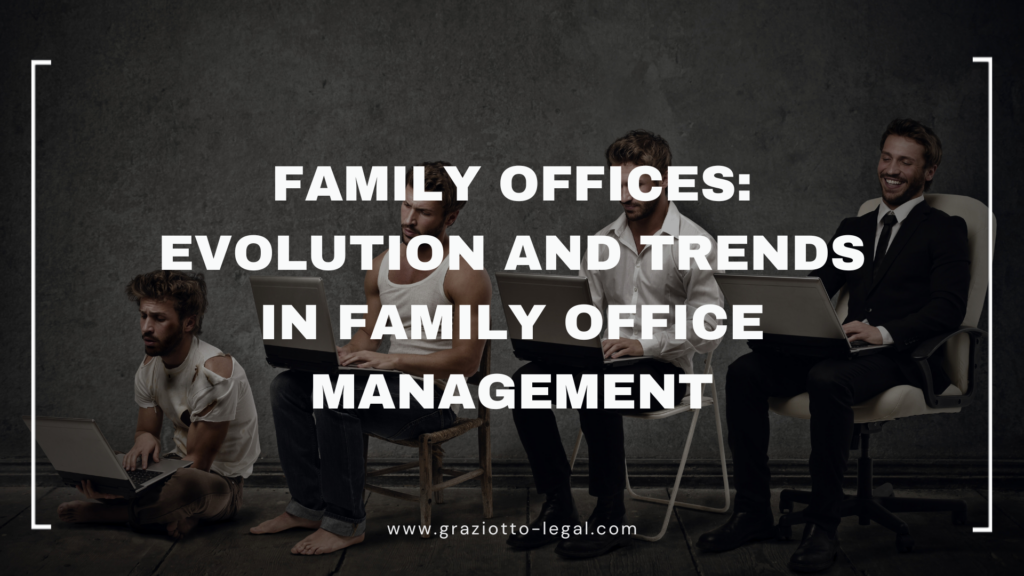

Since 2010, the Global Law Experts annual awards have been celebrating excellence, innovation and performance across the legal communities from around the world.
posted 1 month ago
The concept of a family office has historical roots that extend back centuries. These offices were not known by the modern term but served a similar purpose to what we recognize today. In the medieval era, families of royalty and nobility hired stewards to manage their wealth, property, and daily household affairs.
These stewards were responsible for tasks that encompassed financial management, including land ownership, investments, taxation, and overseeing the financial interests of the family’s entire estate. They served as confidants and trusted aides, managing the private assets of the elite.
During the Renaissance period, particularly in the trading cities of Florence and Venice, the merchant class began to accumulate substantial wealth. Recognizing the need to manage and grow their financial resources, these wealthy merchants established private offices that served functions similar to the stewards of nobility.
They were dedicated to managing investments, overseeing business operations, and ensuring that the family’s financial interests were preserved and grown over time.
The industrial revolution brought about significant changes in the economic landscape, leading to the emergence of a new class of wealthy industrialists and entrepreneurs. This era marked a shift towards a more organized and formalized structure in managing family wealth, aligning closely with what we identify today as the family office.
The family offices during this period started to include not only financial management but also legal matters, succession planning, education for younger generations, and other broader family governance issues. In the United States, the concept of the family office gained traction during the 19th century.
Many point to the family office established by John D. Rockefeller in 1882 as the archetype of the modern single-family office (SFO). His office was created to manage and coordinate various financial, investment, and philanthropic activities for the Rockefeller family.
Over time, the scope expanded to include a more extensive range of services, including legal, accounting, tax planning, and philanthropy. This practice started to spread among other wealthy families in the U.S. and Europe, laying down the foundation for the modern family office structure.
The early family offices were characterized by a strong emphasis on confidentiality and trust. Since they were dealing with the wealth of highly influential families, the stewards and officers had to ensure complete discretion.
The personalized nature of these offices allowed for a high degree of customization, aligning the family’s values, ethics, and long-term goals with their financial and investment strategies. Overall, the origins of the family office can be traced back to the essential need to manage, preserve, and enhance the family wealth.
While the functions and structures have evolved over time, the underlying principles of trust, confidentiality, and alignment with the family’s values remain the cornerstone of the family office concept.
The historical evolution provides valuable insights into how family offices have adapted to the changing economic and social landscape, demonstrating resilience and flexibility.
The 20th century saw further developments and formalization of the family office structure. With the globalization of the economy and increasing complexities in the financial markets, family offices started to evolve in terms of both structure and services.
The period following World War II marked a new era of economic growth and opportunity. The rise of new industries and technologies led to the creation of substantial wealth among entrepreneurs and business families. The need for professional management of this wealth resulted in a surge in the establishment of family offices. These offices were no longer exclusive to the elite and royalty but extended to successful business families seeking professional management for their assets.
With the advancement of technology, family offices began to leverage sophisticated tools for investment analysis, risk management, and reporting. The integration of technology allowed for more efficient operations and decision-making, enabling family offices to handle more complex and diversified portfolios.
The latter part of the 20th century saw family offices becoming more professionalized. There was a growing emphasis on hiring experts in various fields such as finance, law, taxation, and estate planning. These professionals brought specialized skills and knowledge, allowing family offices to provide a more comprehensive range of services tailored to the unique needs of each family.
The increasing interconnectedness of the world economy has had a profound impact on family offices. Many wealthy families began to invest internationally, necessitating a more global perspective in investment strategies and risk management. Family offices started to develop networks across different jurisdictions, understanding local regulations, and building relationships with international banks and financial institutions.
Alongside wealth management, family offices began to play a significant role in philanthropy. Wealthy families started to dedicate substantial resources to charitable causes, and family offices became instrumental in structuring and managing philanthropic endeavors. This added another dimension to the family office’s role, reflecting the broader societal responsibilities and values of the families they served.
The regulatory landscape also underwent significant changes, impacting the way family offices operated. Compliance with various laws and regulations became a vital aspect of family office management. Whether it was taxation laws, anti-money laundering regulations, or reporting requirements, family offices had to adapt to a constantly changing legal environment.
Towards the end of the 20th century, the concept of multi-family offices began to gain popularity. Unlike the single-family office serving one family, MFOs cater to multiple families, providing economies of scale and access to a broader range of services. This shift marked a democratization of the family office concept, making it accessible to a wider segment of wealthy individuals and families.
The early beginnings and origins of family offices are deeply rooted in history, evolving from the private stewards of nobility to the professional and sophisticated entities that exist today.
The adaptation to technological advancements, economic globalization, legal changes, and societal expectations has shaped the family office’s modern landscape.
The core principles of trust, confidentiality, and alignment with family values continue to guide the family office’s function, ensuring that it remains a vital tool for wealth management for affluent families.
For more in-depth information you can consult my latest book «The Global Manual for Family Offices», Volume 1, Chapter 4.1.1, Pg. 239.
Author


No results available
Resetposted 9 hours ago
posted 20 hours ago
posted 3 days ago
posted 4 days ago
posted 5 days ago
posted 1 week ago
posted 1 week ago
No results available
ResetSign up for the latest advisory briefings and news within Global Advisory Experts’ community, as well as a whole host of features, editorial and conference updates direct to your email inbox.
Naturally you can unsubscribe at any time.
Global Advisory Experts is dedicated to providing exceptional advisory services to clients around the world. With a vast network of highly skilled and experienced advisers, we are committed to delivering innovative and tailored solutions to meet the diverse needs of our clients in various jurisdictions.